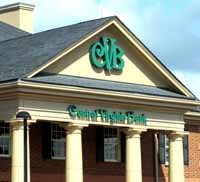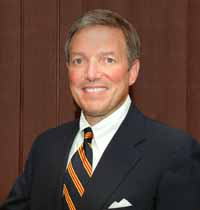 On a table in Herb Marth’s office is a framed photo of himself with Federal Reserve Chairman Ben Bernanke.
On a table in Herb Marth’s office is a framed photo of himself with Federal Reserve Chairman Ben Bernanke.
In the photo, Marth, now serving as interim COO of Central Virginia Bankshares, has a smile on his; Bernanke a subdued grin. It was taken, Marth said, just after Bear Sterns collapsed, when the recession hadn’t quite taken hold. Bernanke probably hasn’t smiled that big since.
The recession has hammered banks but led to lots of new positions for bank turnaround specialists. That’s how Marth’s career at CVB began in Powhatan less than two months ago.
After a couple years of losses, CVB hired Richmond-based Strategic Risk Associates to bring in someone to steer the bank toward more stable financial ground. Marth, 58 started his career at North Carolina National Bank in Charlotte, one of the predecessors of Bank of America. He then honed his skills at local banks.
Below is an edited transcript.
Richmond BizSense: How did you come to work for Strategic Risk Associates?
Herb Marth: In the late 1980s, I was president and CEO of Regency Bank. That bank turned out to be a turnaround situation. I didn’t realize it at the time. We charged off more than 25 percent of our startup capital on bad loans made before I was on the scene. That bank became part of BB&T. From that I went to Crestar Bank to turnaround its private banking unit (SunTrust eventually bought Crestar).
 RBS: How long do you expect to stay at the bank?
RBS: How long do you expect to stay at the bank?
HM: Larry Lyons (CVB’s longtime CEO) has announced his retirement at the end of the year. The board will have a search for a new CEO and I’d hope to be a candidate for that.
RBS: What segment of lending hurt CVB the most the last few years?
HM: It was real estate development, which has been the bread and butter of most community banks for a long time, primarily residential and some in retail commercial development. Retail has taken a big hit. Right here in Richmond – S&K is out of business. Circuit City is out of business.
RBS: What lending segment is tighter right now, commercial or consumer/residential?
HM: What has been less hard hit is commercial office space. Some have thought that’s the next shoe to drop. Commercial and industrial loans – everyone is chasing those but there’s not much out there.
RBS: What’s your response to those who say banks aren’t lending?
HM: This is a lot of rhetoric coming out of Washington. We have plenty of money to lend. We haven’t found the loans. The demand isn’t there. Every business owner is thinking that way from GM to the mom and pop. And they should be thinking that way.
I do have to admit credit standards are tighter, but they should be. We have a group of lenders who like to lend money. Going through a period like this is like golfers in the clubhouse when it’s raining.
RBS: What’s the biggest challenge of taking the helm of a bank that’s been hit with some hard times?
HM: A lot of community banks are under tremendous scrutiny from regulators. The regulators are partners. But scrutiny can be a huge diversion from running the bank itself. And keeping morale high and the various constituents happy (customers, shareholders, employees, directors and regulators).
Frankly, and I don’t mean to sound like the head cheerleader, this is not a startup bank. It’s been around close to 40 years and has a loyal customer base. When you separate all of the smoke, the core earnings really are solid. Not every bank has that luxury. I don’t mean to minimize the losses. They have been significant.
RBS: What’s it like to come into this position given the circumstances. Do you ever worry the bank employees view you as a hired gun?
HM: I feel very much at home here and I feel very welcome.
RBS: Discuss the biggest areas CVB needs to improve.
HM: The thing we need to do the most is raise capital. If it hadn’t been for a double whammy (losses on Fannie/Freddie investments and troubled loans). The Fannie and Freddie investments we had became worthless. It is not an easy time to raise capital. People aren’t feeling good about equities right now. Financials have taken a hit. We’ve talked to investment bankers and we want to go out with a public offering.
RBS: How are you all handling the special assets, i.e. foreclosed properties, especially large plots of land from development loans compared to a single home?
HM: You try to find someone else that can pick up where the development left off. But there’s not a lot of development going on these days. There are around the country groups with deep pockets that can sit on the land until it becomes valuable again. For a house, we immediately list it with a Realtor. Then we wait for offers. At this point, most of them would be in Chesterfield and Powhatan.
Michael Schwartz covers banking for RBS. Please send news tips to Michael@richmondbizsense.com.
 On a table in Herb Marth’s office is a framed photo of himself with Federal Reserve Chairman Ben Bernanke.
On a table in Herb Marth’s office is a framed photo of himself with Federal Reserve Chairman Ben Bernanke.
In the photo, Marth, now serving as interim COO of Central Virginia Bankshares, has a smile on his; Bernanke a subdued grin. It was taken, Marth said, just after Bear Sterns collapsed, when the recession hadn’t quite taken hold. Bernanke probably hasn’t smiled that big since.
The recession has hammered banks but led to lots of new positions for bank turnaround specialists. That’s how Marth’s career at CVB began in Powhatan less than two months ago.
After a couple years of losses, CVB hired Richmond-based Strategic Risk Associates to bring in someone to steer the bank toward more stable financial ground. Marth, 58 started his career at North Carolina National Bank in Charlotte, one of the predecessors of Bank of America. He then honed his skills at local banks.
Below is an edited transcript.
Richmond BizSense: How did you come to work for Strategic Risk Associates?
Herb Marth: In the late 1980s, I was president and CEO of Regency Bank. That bank turned out to be a turnaround situation. I didn’t realize it at the time. We charged off more than 25 percent of our startup capital on bad loans made before I was on the scene. That bank became part of BB&T. From that I went to Crestar Bank to turnaround its private banking unit (SunTrust eventually bought Crestar).
 RBS: How long do you expect to stay at the bank?
RBS: How long do you expect to stay at the bank?
HM: Larry Lyons (CVB’s longtime CEO) has announced his retirement at the end of the year. The board will have a search for a new CEO and I’d hope to be a candidate for that.
RBS: What segment of lending hurt CVB the most the last few years?
HM: It was real estate development, which has been the bread and butter of most community banks for a long time, primarily residential and some in retail commercial development. Retail has taken a big hit. Right here in Richmond – S&K is out of business. Circuit City is out of business.
RBS: What lending segment is tighter right now, commercial or consumer/residential?
HM: What has been less hard hit is commercial office space. Some have thought that’s the next shoe to drop. Commercial and industrial loans – everyone is chasing those but there’s not much out there.
RBS: What’s your response to those who say banks aren’t lending?
HM: This is a lot of rhetoric coming out of Washington. We have plenty of money to lend. We haven’t found the loans. The demand isn’t there. Every business owner is thinking that way from GM to the mom and pop. And they should be thinking that way.
I do have to admit credit standards are tighter, but they should be. We have a group of lenders who like to lend money. Going through a period like this is like golfers in the clubhouse when it’s raining.
RBS: What’s the biggest challenge of taking the helm of a bank that’s been hit with some hard times?
HM: A lot of community banks are under tremendous scrutiny from regulators. The regulators are partners. But scrutiny can be a huge diversion from running the bank itself. And keeping morale high and the various constituents happy (customers, shareholders, employees, directors and regulators).
Frankly, and I don’t mean to sound like the head cheerleader, this is not a startup bank. It’s been around close to 40 years and has a loyal customer base. When you separate all of the smoke, the core earnings really are solid. Not every bank has that luxury. I don’t mean to minimize the losses. They have been significant.
RBS: What’s it like to come into this position given the circumstances. Do you ever worry the bank employees view you as a hired gun?
HM: I feel very much at home here and I feel very welcome.
RBS: Discuss the biggest areas CVB needs to improve.
HM: The thing we need to do the most is raise capital. If it hadn’t been for a double whammy (losses on Fannie/Freddie investments and troubled loans). The Fannie and Freddie investments we had became worthless. It is not an easy time to raise capital. People aren’t feeling good about equities right now. Financials have taken a hit. We’ve talked to investment bankers and we want to go out with a public offering.
RBS: How are you all handling the special assets, i.e. foreclosed properties, especially large plots of land from development loans compared to a single home?
HM: You try to find someone else that can pick up where the development left off. But there’s not a lot of development going on these days. There are around the country groups with deep pockets that can sit on the land until it becomes valuable again. For a house, we immediately list it with a Realtor. Then we wait for offers. At this point, most of them would be in Chesterfield and Powhatan.
Michael Schwartz covers banking for RBS. Please send news tips to Michael@richmondbizsense.com.


